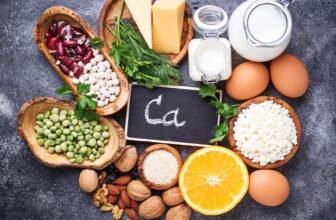Blackberry juice is the juice derived from blackberries (Rubus allegheniensis), a fruit-bearing bramble common to colder Northern climates. The berries of this shrub are dark black or purple, and when ripe, they are sweet and very delicate to the touch. Blackberry juice has been used for thousands of years as a traditional folk medicine for several different health problems and is also known for its simultaneously tart and sweet taste.
| Blackberry juice Quick Facts | |
|---|---|
| Name: | Blackberry juice |
| Colors | Purple |
| Taste | Mild peppery, sweet |
| Calories | 95 Kcal./cup |
| Major nutrients | Vitamin B6 (1923.08%) Manganese (34.78%) Copper (31.67%) Vitamin K (31.67%) Vitamin C (31.33%) |
| Health benefits | Prevent stomach ulcers, Skin health, Cancer protection, Ward off viruses and bacteria, Prevent heart problems |
Blackberry is the fruit produced by many species in the Rubus genus belonging Rosaceae family. Historically blackberries are confused due to apomixes and hybridization so that species are grouped together and known species aggregates. Blackberries are deep purple to blue-black in color is a sweet treat during late spring and summer. Loaded with various nutrients, it could be consumed fresh or for making jellies, jams, and sauces. Blackberry juice is the best way to reap entire health benefits. The delightful purple juice possesses a delicate sweetness and a mild peppery taste. It is loaded with antioxidants that keep the skin look healthy and youthful. Blackberries have anthocyanins which help to keep wrinkles at bay by stimulating the production of elastin and collagen. Blackberry juice acts as a flavor enhancer for frozen novelties, candies, jams, fruit snacks, sauces, jellies, and beverages. In Europe, this juice is used to treat mouth and eye infections and Native American tribes use it to support digestion.
Nutritional value of Blackberry juice, canned
Calories 95 Kcal. Calories from Fat 13.5 Kcal.
| Proximity | Amount | % DV |
|---|---|---|
| Water | 227.25 g | N/D |
| Energy | 95 Kcal | N/D |
| Energy | 395 kJ | N/D |
| Protein | 0.75 g | 1.50% |
| Total Fat (lipid) | 1.5 g | 4.29% |
| Ash | 1 g | N/D |
| Carbohydrate | 19.5 g | 15.00% |
| Total dietary Fiber | 0.2 g | 0.53% |
| Total Sugars | 19.25 g | N/D |
| Minerals | Amount | % DV |
|---|---|---|
| Calcium, Ca | 30 mg | 3.00% |
| Iron, Fe | 1.2 mg | 15.00% |
| Magnesium, Mg | 52 mg | 12.38% |
| Phosphorus, P | 30 mg | 4.29% |
| Potassium, K | 338 mg | 7.19% |
| Sodium, Na | 2 mg | 0.13% |
| Zinc, Zn | 1.02 mg | 9.27% |
| Copper, Cu | 0.285 mg | 31.67% |
| Manganese, Mn | 0.8 mg | 34.78% |
| Vitamins | Amount | % DV |
|---|---|---|
| Water-soluble Vitamins | ||
| Vitamin B1 (Thiamin) | 0.03 mg | 2.50% |
| Vitamin B2 (Riboflavin) | 0.045 mg | 3.46% |
| Vitamin B3 (Niacin) | 1.115 mg | 6.97% |
| Vitamin B5 (Pantothenic acid) | 0.052 mg | 1.04% |
| Vitamin B6 (Pyridoxine) | 25 mg | 1923.08% |
| Folic Acid | 25 µg | N/D |
| Folate, food | 25 µg | N/D |
| Folate, DEF | 16.5 µg | N/D |
| Vitamin C (Ascorbic acid) | 28.2 mg | 31.33% |
| Fat-soluble Vitamins | ||
| Vitamin A, RAE | 15 µg | 2.14% |
| Vitamin A, IU | 308 IU | N/D |
| Beta Carotene | 185 µg | N/D |
| Lutein + zeaxanthin | 170 µg | N/D |
| Vitamin E (alpha-tocopherol) | 2.25 mg | 15.00% |
| Vitamin K (phylloquinone) | 38 µg | 31.67% |
| Lipids | Amount | % DV |
|---|---|---|
| Fatty acids, total saturated | 0.045 g | N/D |
| Palmitic acid 16:00 (Hexadecanoic acid) | 0.035 g | N/D |
| Stearic acid 18:00 (Octadecanoic acid) | 0.007 g | N/D |
| Fatty acids, total monounsaturated | 0.145 g | N/D |
| Oleic acid 18:1 (octadecenoic acid) | 0.135 g | N/D |
| Gadoleic acid 20:1 (eicosenoic acid) | 0.01 g | N/D |
| Fatty acids, total polyunsaturated | 0.86 g | N/D |
| Linoleic acid 18:2 (octadecadienoic acid) | 0.573 g | N/D |
| Linolenic acid 18:3 (Octadecatrienoic acid) | 0.287 g | N/D |
*Above mentioned Percent Daily Values (%DVs) are based on 2,000 calorie diet intake. Daily values (DVs) may be different depending upon your daily calorie needs. Mentioned values are recommended by the U.S. Department of Agriculture. They are not rxharun.com recommendations. Calculations are based on average age of 19 to 50 years and weigh 194 lbs. Source: https://ndb.nal.usda.gov/
Health Benefits of Blackberry juice
Blackberries are used for medicinal purposes for a longer time period. Greeks consume these fruits regularly for preventing mouth diseases and aching joints. Leaves of the blackberry plant are boiled to make tea and used to cure upset stomachs and thinning of hair. Blackberries are rich in antioxidants that help to counteract free radicals with significant health benefits such as:
- Prevent stomach ulcers
Consume Blackberries regularly so that one should not experience ulcer pain. This fruit also protects from stomach ulcers due to the presence of antioxidants called ellagitannins that lower inflammation of the mucosal stomach lining. It is a delicious way to combat ulcers.
- Skin health
Blackberries contain an ample amount of antioxidants which are great for bones and gut and also protect the skin. The extract of Blackberry helps to ward off UVB damage through antioxidant activity protecting keratinocytes which make about 90% of cells in the skin. Being a great source of Vitamin C, it is known as a beauty vitamin. It is a crucial vitamin that plays a vital role in the production of collagen and keeps the skin supple and young.
- Cancer protection
Blackberries are an excellent source of antioxidants, heavily concentrated in anthocyanins help to counteract free radicals or toxins that lead to cancer and other diseases. These antioxidants known as ellagic acid have a vital role in preventing cervical, lung, and breast cancer by prohibiting the development of cancerous cells before they become malignant.
- Ward off viruses and bacteria
Blackberries contain high levels of phytochemicals such as rutin, ellagic acid, and gallic acid that effectively ward off bacteria and viruses that could cause various illnesses. It rejuvenates tired muscles and also speeds up the repairing process of damaged tissues.
- Prevent heart problems
Blackberries contain anthocyanins which help to maintain the overall robustness of the heart. Besides it prevents deterioration of aortic walls, anthocyanins help to avert erratic heartbeat patterns & abnormal blood clotting in veins or arteries that could result in cardiac arrest.
- Brain health
Blackberries contain anthocyanins that stimulate housekeeping mechanisms in neuron passages of the brain which helps to eliminate damaged cells and causes problems such as mental decline and lapses in memory. If not treated, these damaged cells trigger mental problems such as Parkinson’s disease, Alzheimer’s disease, and dementia.
- Oral health
Blackberries carry numerous mouth perks. Blackberries contain antibacterial properties which help to prevent as well as treat oral infections by lowering oral pathogens activity without affecting the healthy cells. Blackberries provide an antiviral effect on some skin infections that affect the mouth such as the herpes virus which causes cold sores.
- Neutralize toxins
Blackberry juice contains Vitamin E and K that offers numerous health benefits. Vitamin E helps to prevent damage to tissues. With an antioxidant activity, it neutralizes toxins from the environment like cigarette smoke and also those which are produced as a natural side effect of metabolism. Vitamin K helps to strengthen bones and plays a vital role in blood clotting. The serving of a cup of Blackberry juice offers 56 micrograms of Vitamin K and 3.3 milligrams of Vitamin E. It grants 22 percent of recommended Vitamin E which has a vital role in blood clotting with 62 percent of vitamin K intake for women and 46 percent for men.
Traditional uses
- Blackberry juice is used by Europeans for treating eye and mouth infections.
- The juice is used for treating digestive problems such as dyspepsia, dysentery, and diarrhea.
- Use the mix of blackberry juice and salt for treating diarrhea.
- Blackberry juice added to curd/yogurt is used to treat digestive problems.
- Drink or apply blackberry juice for teeth-related problems.
- It is also helpful for hemorrhoids and piles.
- It also helps cough, asthma and also enhances the immune system.
Precautions
- Breastfeeding and pregnant women should avoid Blackberry juice.
- As Blackberry juice lowers blood sugar, avoid its intake before/after two weeks of surgery.
- Avoid its intake on an empty stomach and after its intake does not take milk.
- Drink this juice in moderate amounts because its excessive intake results in body fever as well as ache.
- It might cause sputum accumulation in the lungs.
References






